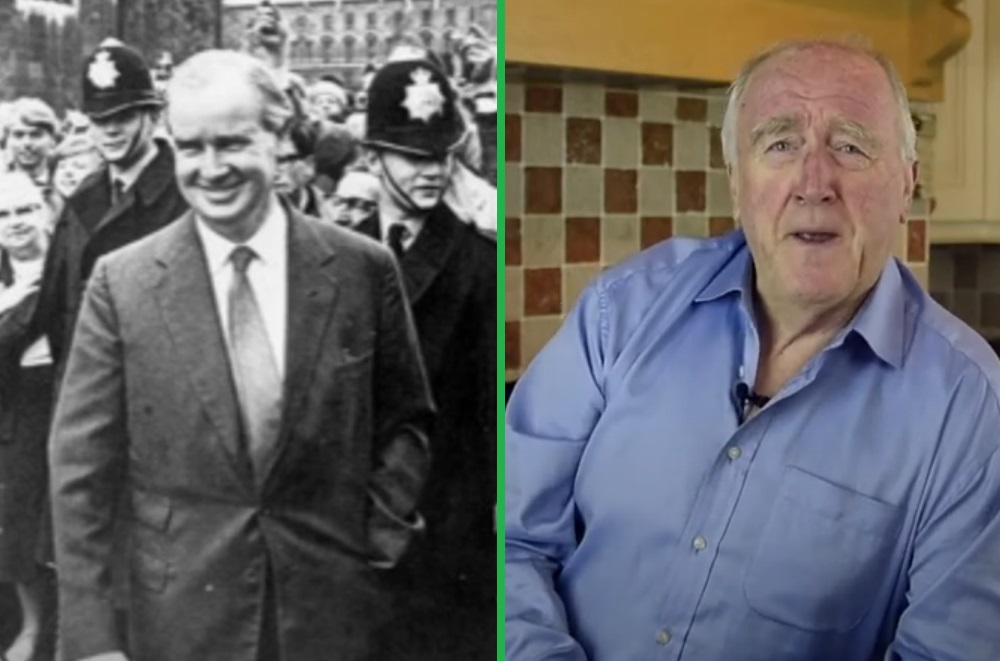Gwynfor v Gwynoro: the story of two political titans who both wanted to represent Carmarthen

Martin Shipton
For an intense period of eight years in the late 1960s and early 1970s, two politicians – one Plaid Cymru, the other Labour – were bitter rivals in their ambition to represent a west Wales seat at Westminster.
In July 1966, Gwynfor Evans had become Plaid’s first MP when he won the Carmarthen by-election.
Now, nearly 60 years later, the Labour candidate who fought three elections against him between 1970 and 1974, has written a book detailing the mutual antagonism and even hatred they felt towards each other.
Gwynoro Jones was only 24 when, in 1967, he was selected as Labour’s candidate for the next general election. In 1970 he won the seat back from Gwynfor, with a relatively comfortable majority of 3,907.
Four years later, at the February 1974 election, Gwynoro held on with a majority of just three votes. But eight months later, in the second general election held that year, Gwynfor emerged as the victor with a majority of 3,640.
Passionate
Beyond the starkness of the statistics, there were passionate feelings on both sides.
In his book, appropriately entitled Only Three Votes, Gwynoro makes clear his feelings of contempt towards Gwynfor, whom he regarded as a deeply flawed politician.
Yet in his final, retrospective chapter, Gwynoro offers grudging praise to his rival for the first time ever.
He writes: “Without a doubt, I said some quite harsh things about Gwynfor. And they needed saying. I do not regret those comments at all. It is difficult to believe today how much Gwynfor was idolised out of all reason, and that is a tendency that continues until today. There hasn’t been a politician in Wales that was idolised by his followers as much as Gwynfor Evans.
“But he wasn’t a god … he was far from being a good politician. He was an enthusiastic missionary at best. A very effective missionary, but that efficiency didn’t make him a good politician at all. It is impossible to think of him in the same breath as some of the great politicians of the period, such as Clem Attlee, who transformed the welfare state, Aneurin Bevan and the health service, Jim Griffiths, the first Secretary of State for Wales, and before those three, Lloyd George. There are plenty more examples.”
Personal qualities
Going on to write of his slight change of heart, Gwynoro writes: “At the time, I hadn’t seen many personal qualities to admire in Gwynfor himself. But the passage of the years has enabled me to see things differently. It’s clear to me now that he had positive personal qualities.
“The most predominant of those was perseverance. For example, he succeeded in fighting against the Labour Party machine, more often than not on his own. And that for a long period of time. He had a vision, formed his vision and kept at it; I’m sure that if he was alive today [Gwynfor died in 2005], we would agree on several things in the context of the future of Wales as a nation.”
As an indication of what a turnaround this amounts to on the part of Gwynoro, he writes: “It is worth noting that in those eight years both of us were fighting against each other, we only spoke face-to-face for less than five minutes. There was obvious antipathy and an element of hatred between the two of us and neither of us respected the other.
“I’m sure that I was the one that showed it most outwardly. It became clear that Gwynfor kept his comments about me for his conversations with his friends and for his writing. He ensured that it was others who wrote to the press and fired the bullets on his behalf.
“But this was a battle between two personalities that fired the central direction of the politics of the whole of Wales for the period.”
Devolution
Ironically, during Gwynoro’s period of time as an MP, he allied himself with colleagues in the Labour Party who strongly favoured devolution and fought against those like Neil Kinnock and Leo Abse who opposed it.
But perhaps the greatest irony of all is that Gwynoro, who was seen by his Welsh nationalist opponent as the embodiment of British unionism, ended up decades later as a supporter of Yes Cymru who was fully behind moves towards a “Sovereign Wales”.
The book includes a Foreword by former First Minister Mark Drakeford, who was a schoolboy in Carmarthen at the time of Gwynfor and Gwynoro’s first electoral outing. Mr Drakeford praises Only Three Votes, stating: “In this book … you will find the vivid eyewitness account of one protagonist’s participation in some of the most memorable events in recent Welsh history, told by a man whose understanding of their significance was, and is, both instinctive and persuasive.”
Only Three Votes by Gwynoro Jones is published by Parthian Books at £12. The author will discuss it at an event held on Friday August 9 in Storyville Books, Pontypridd.
Support our Nation today
For the price of a cup of coffee a month you can help us create an independent, not-for-profit, national news service for the people of Wales, by the people of Wales.








There is extraordinary arrogance in the assertion that Gwynfor wasn’t a good politician. He achieved a lot of his aims specific to Wales. To compare him to people on a larger stage is absurd. Labour lost the plot in Wales in the second half of the 20thC and recent events in the Senedd confirm that they still have a long way to go,
Political personalities so often get in the way of progress, at the cost of the common good…as we well know…stay out of hospital, if you can…
FM Bumble, our lives have been slipping through your fingers…poor Cymru…